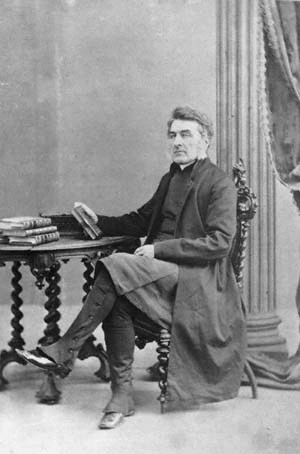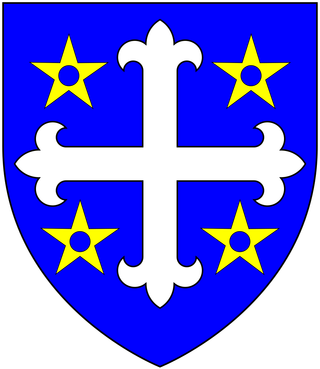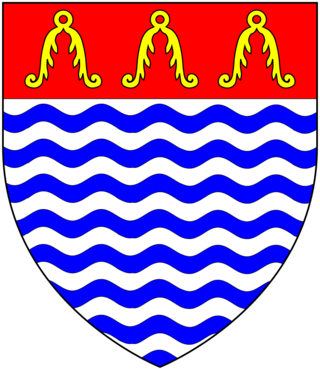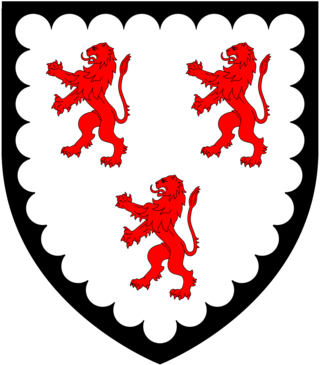Related Research Articles

Francis Fulford was an Anglican Bishop of Montreal.
Richard Stephen Hawkins is a bishop in the Church of England and currently a chapter canon of Exeter Cathedral.

Dittisham is a village and civil parish in the South Hams district of the English county of Devon. It is situated on the west bank of the tidal River Dart, some 2 miles (3.2 km) upstream of Dartmouth.

William Helyar of Coker Court, East Coker, in Somerset, was Archdeacon of Barnstaple and a chaplain to Queen Elizabeth I.
John Pollard was a 16th-century Archdeacon of Wiltshire, Archdeacon of Cornwall, Archdeacon of Barnstaple and Archdeacon of Totnes.
John Northwood was an English medieval churchman and university chancellor.
Richard Sydnor was the Receiver and Steward of Bishop Oldham of Exeter Cathedral from 10 Henry VII (1505) to 5 Henry VIII (1514) - see Exeter Cathedral MS. 3690.

Oliver Whiddon was Archdeacon of Totnes between 1568 and 1580.
Jasper Swift was the archdeacon of Cornwall and Archdeacon of Totnes.
William Cotton was the Archdeacon of Totnes.
George Snell was the Archdeacon of Totnes.
George Baker (1687–1772) was the Archdeacon of Totnes from 1740 until 1772.

The landed gentry and nobility of Devonshire, like the rest of the English and European gentry, bore heraldic arms from the start of the age of heraldry circa 1200–1215. The fashion for the display of heraldry ceased about the end of the Victorian era (1901) by which time most of the ancient arms-bearing families of Devonshire had died out, moved away or parted with their landed estates.

Bernard Smith of Totnes in Devon was MP for Totnes in 1558. He was mayor of Totnes in 1549–50 and c. 1565–6, and was escheator of Devon and Cornwall in 1567–8.

Great Fulford is an historic estate in the parish of Dunsford, Devon. The grade I listed manor house, known as Great Fulford House, is about 9 miles west of Exeter. Its site was said in 1810 to be "probably the most ancient in the county". The present mansion house is Tudor with refurbishment from the late 17th century and further remodelling from about 1800. The prefix "Great" dates from the late 17th century and served to distinguish it from the mansion house known as "Little Fulford" in the parish of Shobrooke, Devon, about 8 miles to the north-east, also owned briefly by Col. Francis Fulford (1666–1700), as a result of his marriage to the heiress of the Tuckfield family. Great Fulford has been the residence of the Fulford family, which took its name from the estate, from the reign of King Richard I (1189–1199) to the present day. There are thus few, if any, families in Devonshire of more ancient recorded origin still resident at their original seat. In 2004 the estate comprised 3,000 acres.
Arthur Champernowne, of Dartington, near Totnes, Devon was an English politician. He was the son of Gawine Champernowne and Roberte de Montgomery. He married Bridget Fulford, daughter of Sir Thomas Fulford, of Great Fulford in Devon on 17 June 1598 in Dunsford. His son was Captain Francis Champernoun of York, Maine.

Ambrose Bellot, of Downton in Devon was a Member of Parliament for East Looe in Cornwall in 1597.

Sir John Kirkham (1472–1529) of Blagdon in the parish of Paignton, Devon, was Sheriff of Devon in 1523/4. He was one of the Worthies of Devon of the Devonshire biographer Prince (d.1723), who called him a "very free and liberal, ... prudent and discreet" benefactor of the town of Honiton in Devon.

Henry Northleigh (1643–1694) of Peamore in the parish of Exminster in Devon, was the MP for Okehampton in Devon.
References
- ↑ Burke, John; Burke, John Bernard (1847). Genealogical and Heraldic Dictionary of the Landed Gentry of Great Britain and Ireland. Vol. 1. p. 451.
- ↑ "Fasti Ecclesiae Anglicanae 1300-1541: Archdeacons:Totnes" . Retrieved 28 May 2024.
